Magic Town

Brief Synopsis
Cast & Crew
William A. Wellman
James Stewart
Jane Wyman
Kent Smith
Ned Sparks
Wallace Ford
Film Details
Technical Specs

Synopsis
Pollster Lawrence "Rip" Smith, a former basketball star and ex-serviceman, is obsessed with finding the "mathematical miracle" that will enable him to conduct accurate but economical surveys. Rip's company is bankrupt, however, as he is unable to compete with his more conventional rival, George Stringer. When Rip realizes that an informal survey conducted in the small town of Grandview by his former army mate, Hoopendecker, exactly matches one of Stringer's national surveys, he concludes that Grandview's demographics are identical to the country as a whole. Having found his "miracle," Rip convinces one of his clients that he can deliver a survey on progressive education by the same date as Stringer, whose company has been working on the project for some time. Rip, right-hand man Ike Sloan and statistician Mr. Twiddle then descend on Grandview, posing as life insurance salesmen. While waiting to speak to the mayor of Grandview, Rip overhears Mary Peterman proposing an ambitious building plan to the city council. Concerned by Mary's cry for change, Rip interrupts her presentation and gives a stirring speech proclaiming Grandview as the perfect American town. The conservative council members use Rip's speech as an excuse to table Mary's proposal, which leads Mary, whose family has run the local newspaper for years, to write a scathing editorial against Rip. Despite Rip's attempts to charm her into issuing a retraction, Mary maintains her stance, but is nonetheless attracted to Rip. Rip, too, feels a growing attraction for Mary and, while continuing his covert poll-taking, spends more and more time with her. Although Ike warns Rip that he is becoming too involved in the town, Rip, who has been coaching the school basketball team, insists that the job comes first with him. On the night before his survey is due, however, Rip attends a school dance and is thanked publicly by Mary's mother. Chagrined by her praise, Rip slips away from the dance and returns to his office to call his client. When a concerned Mary follows him there, she discovers the truth behind his visit and, after condemning him, reports her findings in the next day's paper. To her surprise, her story is picked up by the national press, and a week later, the town is besieged by reporters, who declare Grandview the "public opinion capital of the U.S." Grandview soon becomes a cocky boom town, where its citizens sell their opinions on street corners and the city council announces plans to build a lavish civic center. Ashamed by the changes their actions have wrought, Rip and Mary begin avoiding each other, and Rip eventually leaves Grandview. When a Grandview poll erroneously indicates that seventy percent of Americans would favor a woman President, however, the press makes the town a national laughing stock, and the boom turns to doom. Unable to work, Rip returns to Grandview and confesses his love to Mary. Although Mary also admits to being in love, she tells Rip that they have "murdered" Grandview and are forever tainted by their crime. Rip refuses to accept this verdict and turns to U.S. Senator Wilton, a native of Grandview, for aid. Leading council member Richard Nickleby refuses to consider the senator's plan to raise money for the town, however, and Rip accuses him of "walking out on the team." When Nickleby's son Hank, a member of Rip's basketball team, tells Rip that his father has already sold the civic center land to a speculator, Rip gets the idea to print excerpts from a ground-breaking speech delivered weeks earlier in which the mayor declared that the center would be constructed even if it required building it with "their own hands." The council is outraged by the article, but when the basketball team demands that the center be built as a way of saving Grandview's reputation, other citizens begin to question the legality of Nickleby's sale. Because the council never put the sale to a public vote, the transaction is declared illegal, and the rallying townspeople volunteer their goods and services to construct the center. Having saved their magic town, Rip and Mary happily reunite.

Director

William A. Wellman
Cast
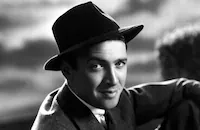
James Stewart
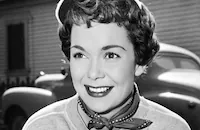
Jane Wyman

Kent Smith

Ned Sparks
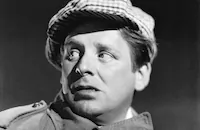
Wallace Ford

Regis Toomey

Ann Doran
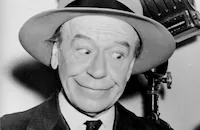
Donald Meek
E. J. Ballantine
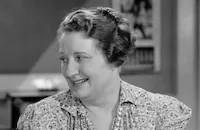
Ann Shoemaker
Mickey Kuhn

Howard Freeman
Harry Holman
Mary Currier
Mickey Roth
Frank Fenton

George Irving
Robert Dudley
Julia Dean
Joel Friedkin
Paul Scardon
George Chandler
Frank Darien
Larry Wheat
Jimmy Crane
Richard Belding
Danny Mummert
Eddy Waller
Dick Elliott
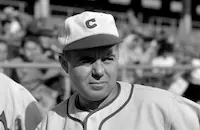
Ray Walker
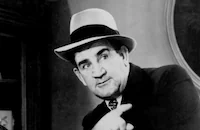
Tom Kennedy
Dick Wessel
Tom Fadden
Anne O'neal
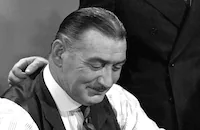
Edward Keane
Anna Q. Nilsson

Griff Barnett
Edgar Dearing
Wheaton Chambers
Lee "lasses" White
Crew
Milo Anderson
C. Bakaleinikoff
Lionel Banks
Joseph F. Biroc
Arthur S. Black
Stanley Goldsmith
Edward Heyman
William S. Holman
William Hornbeck
Terry Kellum
Joseph Krumgold
Otho Lovering
Howard Richmond
Robert Riskin
Robert Riskin
Robert Riskin
George Sawley
Sherman Todd
Mel Torme
John Tribby
William Watson
Roy Webb
William A. Wellman
Robert Wells
A. Westendorf
Richard G. Wray

Videos
Movie Clip



Film Details
Technical Specs

Articles
Magic Town
"Rip" Smith (James Stewart) runs a polling company that conducts surveys. He believes that he has found a small town that serves as a perfect sample of the national demographic, and travels there with his team to conduct a poll. There, he meets Mary Peterman (Jane Wyman), who wants to grow the town, which would destroy what Rip believes to be his perfect microcosm. He goes on a campaign to keep the town as it is, putting him at loggerheads with Mary, to whom he is now attracted. In the cast were Kent Smith, Ned Sparks, Wallace Ford, Regis Toomey, Ann Doran and Donald Meek. Famed newscaster Gabriel Heatter appears in a cameo as himself.
Magic Town , the first film produced by Robert Riskin Productions, was shot at the RKO lot, the RKO Ranch in Encino, just over the Sepulveda Pass from the studio, and in Chico, California from October 24, 1946 to mid January 1947, with additional scenes shot in the two weeks from mid to late June, 1947. Character actor Donald Meek, who played Mr. Twiddle, passed away in the middle of production on November 18, 1946. Riskin was forced to alter the script slightly to explain his absence by having Ned Sparks' character tell Stewart "Mr. Twiddle took the earlier train." Another alternation had to be done with the name of the town. Originally, it was Grandville, but there was only one actual Grandville in the United States, which could open the producers to a lawsuit, so it was changed to Grandview, because there were thirteen Grandviews at that time and none could claim it was based on them.
Like most films, the casting was not set in place at first. Director William Wellman was considering Janet Blair for Jane Wyman's part, as he had directed her in Gallant Journey (1946), and later Arleen Whelan and Loretta Young were both announced in the press as having accepted the role. Young was about to begin production, but fell ill, and RKO borrowed Wyman from Warner Bros., where she was under contract. The one constant was James Stewart's character, which was written expressly for him by Riskin, who also modeled the hardware store in the film after Stewart's father's real-life hardware store where he proudly displayed his son's Academy Award. As late as July 1946, Riskin was trying to get Irving Berlin to write a theme song for the film, but Mel Tormé and Bob Wells eventually composed one as an instrumental.
The original cut ran three hours and was screened to a preview audience at that length. The audience reaction cards saying that the narrative was confusing and disconnected necessitated reshoots with new footage and retakes of old. It didn't help. When the film was released in October 1947, New York Times critic Bosley Crowther wrote that the film "lacks conviction, for all its humorous reflections of small-town life and for all the loose-jointed, soda-cracker acting of James Stewart in the principal role. And that, we're afraid, is because Mr. Riskin wasn't altogether sure of his point--or, maybe, tried to build a bridge to it with a lot of rather old theatrical boards. [...] In fact, if a scientific breakdown of public opinion on this film were made, we would fear for its optimism."
The public appeared to agree with Crowther, and the film lost $350,000. In 1953, Bank of American National Trust and Savings was awarded a deficiency judgment of $598,582 against Robert Riskin Productions for money owed after the film was foreclosed on due to the loss at the box office.
SOURCES: Crowther, Bosley "Magic Town' Film Site Where James Stewart Polls Public Opinion and Courts Radiant Jane Wyman, Bill at Palace" The New York Times 8 Oct 47
http://www.afi.com/members/catalog/DetailView.aspx?s=&Movie=25262 The Internet Movie Database
By Lorraine LoBianco

Magic Town
Quotes
The air becomes charged with electricity around desperate men.- Mary Peterman
Trivia
Notes
The working title of this film was The Magic City. One of Robert Riskin's two onscreen credit reads, "Written and produced by Robert Riskin." Although two songs are credited on the film, only part of one was heard in the viewed print. In the film, James Stewart and Jane Wyman recite two poems, "Charge of the Light Brigade" by Lord Alfred Tennyson (1854) and "Hiawatha" by Henry Wadsworth Longfellow (1855). This picture was the first independent production of writer Robert Riskin, a frequent collaborator of director Frank Capra, and marked comic actor Ned Sparks's return to the screen after a four-year absence. Actor Donald Meek died on November 18, 1946 while the film was in mid-production. Meek's sudden departure from the story is noted in the film by the line, "Mr. Twiddle took the earlier train," which is spoken sadly by Sparks's character to Stewart's. Although Sherman Todd and Richard G. Wray are credited onscreen as editors, Otho Lovering is listed as editor in Hollywood Reporter production charts. In addition, Stanley Goldsmith is mentioned in Hollywood Reporter pre-production news items as assistant director, but Art Black, a Capra collaborator, is credited onscreen as the film's assistant director.
Contemporary news items add the following information about the production: The story of the picture "evolved" from Riskin's experiences while serving as chief of the overseas motion picture bureau of the Office of War Information. Director William Wellman worked on the "mechanical" aspects of the screenplay with Riskin. To avoid controversy, Riskin changed the name of his fictional town from Grandville to Grandview because while there was only one real Grandville in the United States at the time, there were thirteen Grandviews. In April 1946, Wellman reportedly was considering Janet Blair, whom he had directed in Columbia's film Gallant Journey, as the picture's female lead. Both Arleen Whelan and Loretta Young were then announced as the stars, but Young was forced to leave the production before shooting began because of ill health. RKO borrowed Jane Wyman from Warner Bros. for the production. Kay Mulvey, the Western editor of Woman's Home Companion, was signed to play "Ma Peterman," but Ann Shoemaker appeared in the part. Harvey Fischman, a former "Quiz Kid," Lee Phelps, The Sheriff's Boys Band, who were to "impersonate a junior high school outfit," Marvin Lee, Richard West, Mike Marienthal and Polly Bailey were announced as cast members, but their participation in the final film has not been confirmed. "Burlesque kings" Eddie Kane, Billy Newell and Bert Hanlon were also cast in the film, but their participation in the final film has not been confirmed. Joe Yule was announced as a cast member, but was not seen in the viewed print. In July 1946, Riskin was negotiating for Irving Berlin to write the film's theme song. Ross Bellah and Joseph Toldy were announced in August 1946 as the picture's set designers, but their contribution to the final film has not been confirmed. RKO borrowed montage editor William Hornbeck from Liberty Films. After locations were scouted in Nevada and in Northern California, Chico, in North Central California, was finally selected as the film's all-American town. The civic center scene was shot at the RKO Ranch in Encino, CA. During the filming of the final scenes, general manager William S. Holman acted as supervising producer. A rough cut of the picture ran three hours and was presented to its first preview audience at that length. In mid-June 1947, Riskin put the film back into production because a sneak preview audience complained that the story was disconnected. Retakes and added scenes took two weeks to complete. Four publishing houses reportedly vied for the right to publish the book version of the film, but no information regarding a novelization has been found. In June 1953, a judge awarded Bank of America National Trust and Savings a deficiency judgment of $598,582 against Robert Riskin Productions on money owed following foreclosure on the film. The picture was foreclosed on because of revenue deficits.
Modern sources add the following information about the production: Stewart's role was written expressly for him by Riskin, and the hardware store depicted in the film was modeled after one that Stewart's father owned. In a modern interview, Capra claimed that he worked on the script with Riskin and that Riskin began as director but was replaced by Wellman. Wellman, however, was the only director on the project. Modern sources add Peter Stackpole and Roy Craft to the cast as "reporters," and William Haade and Frank Marlowe as "movers." One modern source lists Paul Maxey, Emmett Vogan and Snub Pollard as cast members, but those actors were not seen in the viewed print. James Stewart and Jane Wyman reprised their roles in a Lux Radio Theatre broadcast on December 15, 1947.














